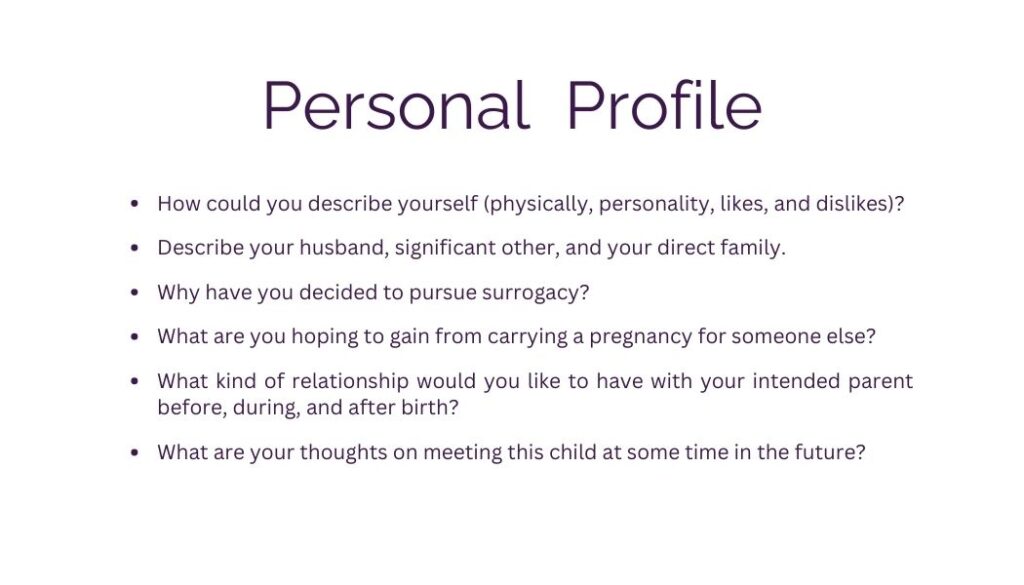Step1: Questionnaire & Personal Profile
Screening a surrogate is one of the most important steps to take on your journey to parenthood. You intend to entrust this person with the gestation of your future child, so the screening process should never be underestimated. Asking your surrogate to complete a questionnaire should always be comfortable. She should understand that it will provide you with key information to determine her suitability. If you are not sure what to ask or what is involved, we provide a sample questionnaire on the website under the surrogacy section.
The purpose of the questionnaire is to:
- Document her medical history, income, the reason for becoming a surrogate, understand her family dynamics (married, living with someone, number of children, education), etc. You, your mental health professional, your fertility doctor, and a lawyer should review the questionnaire.
- The act of her completing the Questionnaire (which is rather lengthy) will show her commitment to this journey.
- The questions asked may cause your surrogate to think of questions she had not thought of before.
- Provide a written reference that can be referred to if questions or confusion about a factual issue occur.
In addition to the actual Questionnaire, you should ask your surrogate to write an essay about herself and her family that you can read and potentially share with your child as your child grow up. Here is an example of the questions that she could answer in writing her Personal Profile:

Step 2. Law on Surrogacy
We suggest you consult with legal counsel to fully understand the potential implications where laws differ depending upon the location or jurisdiction that applies in different circumstances. Some examples could be: –
- The location where your surrogate resides.
- The location where your surrogate works (if different from where she resides)
- The location where your surrogate will deliver (if different from where she resides).
- The location of the intended parent(s)
This is important because, in some locations, a child’s legal status depends on the laws of where the intended parent resides. For example, if an American intended parent participates in surrogacy in a foreign country but intends to return home with the child, that child MUST be genetically related to the intended American parent to be eligible for an American passport. Each country has its own standards to meet before a child can return home with his/her parents. Many parents have found themselves stranded in foreign countries because they failed to understand the legal requirements of their country of residence fully.
It is equally important that the surrogate understands and agrees not to travel to a location that could jeopardize the intended parents’ parental rights if a premature birth should occur.
Step 3. Criminal Background Check
It is also important to know if a surrogate and any adult living in her household have a criminal record. A criminal record does not necessarily exclude participation in surrogacy but is an important factor to know.
Example 1: A surrogate who fought with her mother on her 18th birthday (legal age in the USA) storms out of the house and takes the car registered to the mother. Out of anger, the mother reports her car stolen by her daughter. The daughter is arrested for theft. Fast forward, and the surrogate is 34 years old, a mother of two children, has no other criminal record, and is a registered nurse. Despite her earlier criminal record, all agencies and mental health professionals would accept this application.
What is important is knowing about any criminal history and having an open conversation.

Example 2: A surrogate signs up for a second surrogacy journey after an uneventful first surrogacy delivery. The surrogate has since gotten divorced and has a new boyfriend. A criminal history reveals that her boyfriend is a registered sex offender. Most agencies and mental health professionals would not accept this application.
Step 4: Medical Records
Medical records are clearly critical in deciding whether to proceed with your intended surrogate. However, obtaining obstetrician and delivery records can frequently be complicated. It is, therefore, important to know that key information may be limited. Some examples may be that the records may be over 5 years old and therefore not readily available for inspection (as they may be in a medical storage facility), or some doctor’s offices may have closed or cannot locate the records. In some countries, there may even be no medical records available.
Once records are obtained, someone needs to read them. These could be 20 pages or 500 pages. Understanding medical terminology, shorthand writing, and, of course, deciphering the doctor’s handwriting can be complicated, but it is important that a qualified medical person reads the records. Information in the records may preclude the surrogate from continuing her journey.
Step 5: Medical Insurance Evaluation
Medical insurance is a complicated issue, often overwhelming most intended parents. No matter how complicated and overwhelming insurance is, it is important that every intended parent understands it. We cover this topic in detail on the website.
Unless medical cover for the surrogate is provided for free, e.g., some countries cover the mother and baby at birth, then the surrogate must have insurance to cover her pregnancy, complications, and the birth. It is highly recommended that the intended parents investigate coverage for medical bills incurred due to delivery complications. The costs associated with no medical coverage for complications can be hundreds of thousands of dollars.
Even if the surrogate is eligible for national health coverage, take the time to ensure that the state insurance will cover a surrogacy pregnancy and delivery.
If insurance needs to be purchased for the surrogate, ensure everyone understands who pays the premiums and who checks that the premiums are indeed being paid each month. If a premium is missed, who is responsible for the resulting costs? In some countries, the law states that the intended parents are responsible for all medical costs, and therefore, it is important to ensure that medical insurance is in place to cover these expenses.
Newborn baby care costs can range from a few hundred dollars to hundreds of thousands of dollars. Every intended parent should ensure that a newborn has adequate medical insurance coverage. An agency or legal advisor can assist with the verification of insurance issues.
Step 6: Social Disease Testing
The surrogate, her significant other, and both intended parents should undergo social disease testing. If an intended parent has a social disease (including HIV), the surrogate has a right to know and the right to elect to help a different intended parent. For clear medical reasons, it is important that the surrogate and her partner undergo testing before any embryo transfer.

Step 7: Financial 101
The surrogate should openly discuss costs with her intended parents and/or her agency. Even if the surrogate does not receive any financial compensation, she will have expenses that should be reimbursed. The general rule is that any expense that the surrogate would not normally incur but for this pregnancy, should be paid for by the intended parents.
For example: a surrogate is on bedrest for 2 weeks and must take that time off work. Her company decides not to pay her during this time and allocates the time off against her vacation and/or sick time. The intended parents should reimburse her for the entire 2 weeks, even though she is using up her vacation and sick time. If the surrogate decides to vacation with her family after this pregnancy, she may have no remaining vacation time and, therefore, must take a vacation without pay. If she becomes ill after the pregnancy, she may also have no remaining sick time if all of it was allocated against the pregnancy. It is only fair that the surrogate be paid for the time off work as her family will be financially burdened by her loss of sick and/or vacation time.
For example, a surrogate must take three days off work for the transfer. Can she charge for lost wages and childcare? Lost wages should clearly be paid, but if she usually pays for childcare while at work, she should not be reimbursed for those three days. However, if she needs extended childcare beyond what she would normally need because the doctor orders her to rest, the intended parents should be responsible for this cost.
For example, the surrogate needs some additional bloodwork done, and her insurance policy does not pay for this kind of testing. The intended parents need to pay for the additional testing. The surrogate would not be required to incur these costs if she were not pregnant, and therefore, the costs should be paid by the intended parents.
Step 8: Psychological Evaluation
This may be the single most important evaluation needed in surrogacy. A mental health professional will separately meet with the surrogate (and her partner), the intended parents, and then everyone as a group. Each session has different purposes and goals and is instrumental in building and planning the surrogacy journey.
The surrogate must be able to provide informed consent about her participation in surrogacy and relinquish a child to its parents. Meeting with a counselor will help her understand if surrogacy will afford her a positive experience or negatively impact her life and her family. The counselor will strive to understand the surrogate’s motivation(s) for becoming a surrogate, her personality, her decision-making process, social and family relationships, her support system, how she has resolved problems historically, her ability to take care of herself, and her family and her intellectual competency. The counselor will also assess the surrogate to determine how she will respond to and resolve key issues that may arise during the pregnancy.
Most mental health professionals will require the surrogate to participate in psychological testing. The testing is a tool used to identify personality style, psychopathology, potential behavior problems (such as drug abuse, addiction, hostility towards authority figures), stresses in her life, and her ability to be truthful and forthcoming.
Meeting with the intended parents will also assist the counselor in understanding their expectations of the surrogate and the journey, along with their views on the termination of a pregnancy. This allows the counselor to educate the intended parents and understand their decision-making process, their ability to trust another person, and the level of control they will exert during this pregnancy – and if they will tend to micromanage the surrogate.

The mental health professional will then host a meeting with all parties. During this meeting, the counselor will endeavor to ensure that all parties understand the motivations and expectations of each other, along with understanding the process. The aim is to establish a respectful relationship between the parties while at the same time ensuring there is an open discussion about the surrogate’s right to privacy and her right to make medical decisions about her own body. The counselor will encourage a discussion on the preferred method of communication and conduct during this relationship and what is not acceptable.
Communication problems are a frequent reason for the breakdown in the relationship between the intended parent and surrogate, primarily due to inadequate expectations, setting, and planning. The mental health professional will set the groundwork to ensure good communication between the parties and understanding expectations. Counseling allows all team members to work through issues separately and together. The counselor maintains and supports the mental health of the individuals, the group, and the relationship.
Step 9: Medical Evaluation
Every intended parent wants the safest and healthiest environment for their child to develop in. In addition, no parent would ever want harm to come to their lovely surrogate, who has graciously volunteered to help them have a family. For all these reasons, it is important that the surrogate undergoes an intensive medical evaluation by an appropriately qualified reproductive endocrinologist or doctor qualified in the field of reproduction.
Step 10: Legal Contracts
The legal contract should clearly outline each party’s rights, roles, and responsibilities before, during, and after pregnancy. The contract will contribute greatly to limiting disputes, misunderstandings, and miscommunications while at the same time offering protection to everyone involved in the surrogacy process. Therefore, the contract must be collaborative, with each party represented by independent legal counsel.
The typical process is for the intended parents and their attorney to draft an agreement, which is then sent to the surrogate and her attorney for review. The surrogate and her attorney will discuss each contract term, making any necessary changes and asking for clarifications where needed. The two attorneys meet to review all questions and present the changes to their clients. These negotiations continue until everyone agrees. All parties sign the final contract. The attorneys should also send each other confirmation in writing that their client received independent legal advice, has informed consent, and is signing the contracts voluntarily without undue influence. It is recommended that the signatures to the contract be witnessed.
The contract should comprehensively address various crucial issues. First and foremost, it must clearly outline the compensation to be paid to the surrogate and the reimbursable expenses. Documenting a mutual understanding of these financial matters prevents any unplanned, unreasonable, or potentially unlawful requests for payments from the intended parents, especially in cases where government regulations govern expenses.
The contract should also serve as a protective measure for the surrogate. It sets forth the reimbursements and compensation she is entitled to and the specific timelines for these payments. Additionally, it ensures that the intended parents take responsibility for covering all medical bills, even if they are in the surrogate’s name.
The contract should detail the expected behavior and responsibilities of both parties to ensure a healthy pregnancy. It should outline the agreed-upon testing procedures and address sensitive topics, such as pregnancy termination or reduction, in a comprehensive manner. Furthermore, it should clearly establish who will be recognized as the legal parents of the child(ren) and how parental rights will be established for the intended parents.
Ultimately, a well-drafted contract plays a role in safeguarding all parties involved, protecting them from potential risks and liabilities that may arise during the surrogacy journey.
We sincerely hope that these 10 steps to screening as a surrogate provide you with valuable and informative guidance as you pursue your dream of parenting.
Author: Karen Synesiou, Infertility Portal, Inc.


